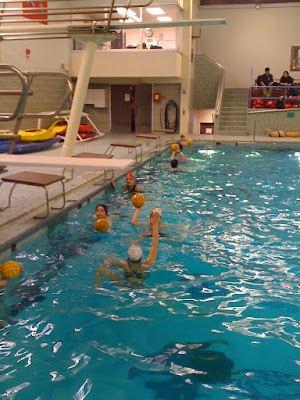Not too long ago I wrote a blog that dealt with Talent. This outlined some of the things that went into the creation of talent according to author Dan Coyle. Last night I experienced a very specific example of how Total Concentration during practice can make a profound difference in a single practice.
This is a practice with 12U and 14U players and it was an unusually small group due to some player illness and schedule conflicts that resulted in having to modify what might have happened during the normal session at that pool. This allowed (required?) me to try some different things with a group that has a very, very broad range of focus.
We were doing some passing drills about 60 minutes into the practice that had small groups and mentor relationships. I created mixed age group pairings ie 12U player with 14U so that young athletes could be lead in the water by an older peer. To get the older athletes attention and focus I included a negative reinforcement for dropped passes - pairs had to swim about 15m to the bulkhead and back with each dropped ball. The older ones did not want to swim if they could pass so it became a project for each one to find a way to get their young partner to focus on the catch and pass routine.
 The picture above shows some of the pairs along the wall passing, others are swimming and out of the picture. I had to switch partners after about 5 or 6 minutes when I could see which 12U boy was unable or unwilling to listen to his mentor. After that adjustment we had pairs that all found a way to cooperate on the task the older player set for them. The change in focus of the young players in this situation actually surprised me in a big way. Hanika, in the red hat above, has a good deal of patience and worked the whole time with the youngest boy, Aidan. At 8 he is not confident that he can repeatedly pass the ball in a pair and it took some time for Hanika to get him on task. By the end of the session he was able to do almost 50 passes without dropping the ball and that is about 40 more than he has ever shown us before.
The picture above shows some of the pairs along the wall passing, others are swimming and out of the picture. I had to switch partners after about 5 or 6 minutes when I could see which 12U boy was unable or unwilling to listen to his mentor. After that adjustment we had pairs that all found a way to cooperate on the task the older player set for them. The change in focus of the young players in this situation actually surprised me in a big way. Hanika, in the red hat above, has a good deal of patience and worked the whole time with the youngest boy, Aidan. At 8 he is not confident that he can repeatedly pass the ball in a pair and it took some time for Hanika to get him on task. By the end of the session he was able to do almost 50 passes without dropping the ball and that is about 40 more than he has ever shown us before. The really amazing shift though was with Zacharia, above on the right. He really responded well to Sam who was determined to; 1) not swim at all, 2) not be outdone by any other mentor. Zach has a tendency when catching the ball to lay out on his back and wait for it to drop from the sky into his hand as he sinks. This makes his passing partner want to lob the ball more and more softly which negatively reinforces the poor catching position. Sam realized this and worked patiently to find the strength, power and arch of a pass that Zach could absorb without laying on his back. The end result, after about 15 minutes together, was these 2 passing the ball 300 times without dropping it.
The really amazing shift though was with Zacharia, above on the right. He really responded well to Sam who was determined to; 1) not swim at all, 2) not be outdone by any other mentor. Zach has a tendency when catching the ball to lay out on his back and wait for it to drop from the sky into his hand as he sinks. This makes his passing partner want to lob the ball more and more softly which negatively reinforces the poor catching position. Sam realized this and worked patiently to find the strength, power and arch of a pass that Zach could absorb without laying on his back. The end result, after about 15 minutes together, was these 2 passing the ball 300 times without dropping it. I didn't hear a word out of Zach the whole time he was passing, the first 15 minutes of silence he and I have shared at the pool. Now I see what he is capable of with Total Concentration and my role as a coach is to help him find that each day. A big task with 12U players, for sure, that is why it's important to lead this group with a mix of knowledgeable, experienced coaches somewhere in their regular routine.

